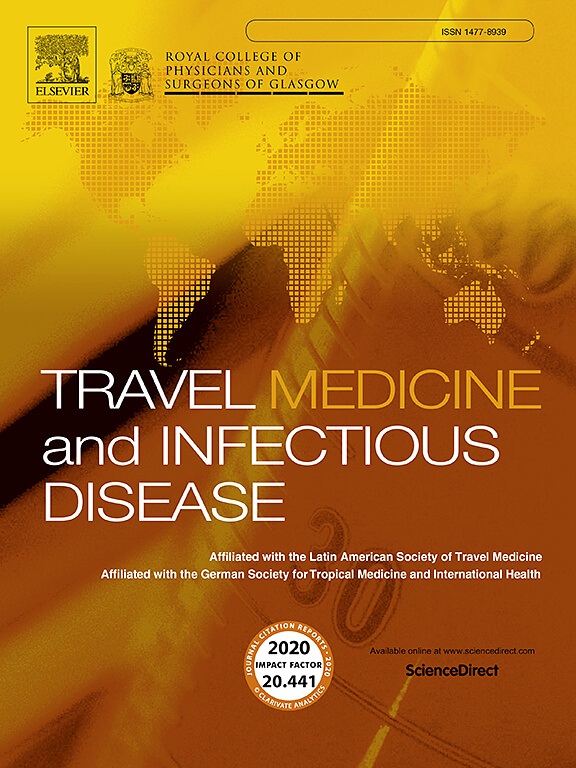Travel-related potential rabid animal post-exposure consultation at the Thai Travel Clinic, Hospital for Tropical Diseases, Bangkok, Thailand
IF 4.7
3区 医学
Q1 INFECTIOUS DISEASES
引用次数: 0
Abstract
Background
Rabies exposure remains a significant public health concern in South and Southeast Asia. Despite the disease being vaccine-preventable, international travelers remain at risk of rabies infection due to the limited access to vaccines and immunoglobulin. This retrospective review aims to analyze post-exposure rabies consultations at the Thai Travel Clinic providing insights into epidemiology, risk factors, and post-exposure management for international travelers.
Methods
A retrospective study included international travelers of all ages who visited the Thai Travel Clinic at the Hospital for Tropical Diseases in Bangkok, Thailand for potential rabid animal post-exposure management between January 1, 2019, and March 31, 2024.
Results
Among 306 international travelers, 91.5 % were healthy with no underlying medical conditions. Approximately 30.9 % traveled in Southeast Asia for less than one month, 46.6 % for one to six months, and 20.8 % for over six months. The majority of bites were from dogs (46.3 %), followed by monkeys (23.9 %) and cat (23.5 %). Common exposure locations included streets (40.1 %), followed by islands or beaches (20.5 %). The median time from arrival in Thailand to animal exposure was 30 days, with 14.7 % bitten within the first week. World Health Organization (WHO) category III rabies wounds accounted for 59.8 % (176/294) of cases. Only 47.5 % (144/303) received the first dose of the rabies vaccine on the day of exposure, and 57.9 % (70/121) experienced delays in receiving rabies immunoglobulin. Additionally, two travelers (2/149; 1.3 %) refused rabies immunoglobulin despite it being clinically indicated. Only 35.3 % (108/306) had pre-travel consultations, and 9.5 % (29/306) of all travelers completed rabies pre-exposure vaccination.
Conclusions
Over half of the international travelers delayed initiating rabies vaccine or immunoglobulin after potential rabid animal exposure. As rabies is a fatal yet preventable disease, this review underscores the urgent need to raise awareness about the importance of prompt post-exposure management. Strengthening traveler education and advocating for pre-exposure immunization are critical strategies to mitigate risks and improve outcomes.
在泰国曼谷热带病医院泰国旅行诊所进行与旅行有关的狂犬病接触后咨询。
背景:狂犬病暴露在南亚和东南亚仍然是一个重要的公共卫生问题。尽管这种疾病可以通过疫苗预防,但由于获得疫苗和免疫球蛋白的机会有限,国际旅行者仍然面临狂犬病感染的风险。本回顾性综述旨在分析泰国旅游诊所暴露后狂犬病咨询情况,为国际旅行者提供流行病学、风险因素和暴露后狂犬病管理方面的见解。方法:回顾性研究包括2019年1月1日至2024年3月31日期间到泰国曼谷热带病医院泰国旅行诊所接受狂犬病暴露后管理的所有年龄段的国际旅行者。结果:306名国际旅行者中,91.5%的人健康,无基础疾病。约30.9%的人在东南亚的旅行时间少于一个月,46.6%的人在一至六个月,20.8%的人在六个月以上。以狗(46.3%)、猴子(23.9%)和猫(23.5%)次之。常见的暴露地点包括街道(40.1%),其次是岛屿或海滩(20.5%)。从抵达泰国到接触动物的中位时间为30天,14.7%的人在第一周内被咬伤。世界卫生组织(WHO) III类狂犬病伤口病例占59.8%(176/294)。只有47.5%(144/303)的人在暴露当天接种了第一剂狂犬病疫苗,57.9%(70/121)的人在接种狂犬病免疫球蛋白时出现延迟。此外,两名旅行者(2/149;1.3%)拒绝狂犬病免疫球蛋白,尽管有临床指征。只有35.3%(108/306)的旅行者进行了旅行前咨询,9.5%(29/306)的旅行者完成了狂犬病暴露前疫苗接种。结论:超过一半的国际旅行者在潜在的狂犬病动物暴露后延迟接种狂犬病疫苗或免疫球蛋白。由于狂犬病是一种致命但可预防的疾病,本综述强调迫切需要提高对暴露后及时管理重要性的认识。加强旅行者教育和倡导接触前免疫接种是减轻风险和改善结果的关键战略。
本文章由计算机程序翻译,如有差异,请以英文原文为准。
求助全文
约1分钟内获得全文
求助全文
来源期刊

Travel Medicine and Infectious Disease
PUBLIC, ENVIRONMENTAL & OCCUPATIONAL HEALTH-INFECTIOUS DISEASES
CiteScore
19.40
自引率
1.70%
发文量
211
审稿时长
49 days
期刊介绍:
Travel Medicine and Infectious Disease
Publication Scope:
Publishes original papers, reviews, and consensus papers
Primary theme: infectious disease in the context of travel medicine
Focus Areas:
Epidemiology and surveillance of travel-related illness
Prevention and treatment of travel-associated infections
Malaria prevention and treatment
Travellers' diarrhoea
Infections associated with mass gatherings
Migration-related infections
Vaccines and vaccine-preventable disease
Global policy/regulations for disease prevention and control
Practical clinical issues for travel and tropical medicine practitioners
Coverage:
Addresses areas of controversy and debate in travel medicine
Aims to inform guidelines and policy pertinent to travel medicine and the prevention of infectious disease
Publication Features:
Offers a fast peer-review process
Provides early online publication of accepted manuscripts
Aims to publish cutting-edge papers
 求助内容:
求助内容: 应助结果提醒方式:
应助结果提醒方式:


